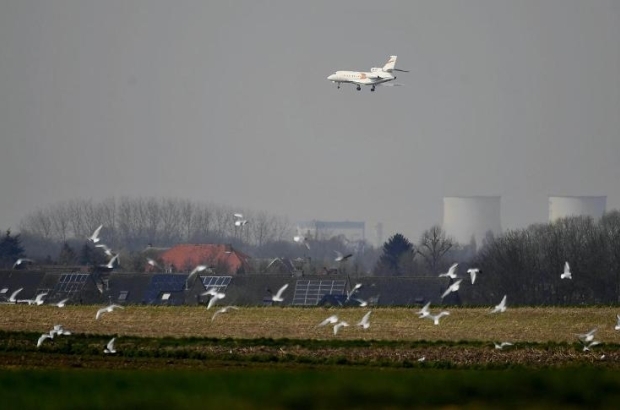- Daily & Weekly newsletters
- Buy & download The Bulletin
- Comment on our articles
Federal government ordered to change Brussels Airport flight paths again
The long-running saga of noise pollution caused by airplanes landing and taking off from Brussels-Zaventem airport is not going away any time soon, after another successful appeal against the current flight paths by the Flemish government.
The Belgian Court of First Instance has ruled that within six months, the federal government will have to modify the airline routes and timings to and from Zaventem.
This decision followed a case against the state brought by the Flemish government and five municipalities - Grimbergen, Machelen, Meise, Wemmel and Vilvoorde - to the court over the new take-off and landing procedures implemented in October 2023.
The Flemish government had criticised the new routes introduced in October. According to an environmental assessment study carried out by the Flemish environment ministry, these caused “noise nuisances that were stronger, day and night, to the north and north-west of the Brussels periphery,” meaning that Brussels benefited but Flanders lost out.
“Radar and noise measurements have clearly shown that municipalities in the north and north-west of the Flemish periphery in particular are now more heavily impacted,” said Flemish minister Ben Weyts (N-VA).
Changes to the route were made without any consultation and contradicted a previous ruling requiring the federal government to pay compensation to affected municipalities, Weyts argued.
Calling for a fair distribution of the burdens associated with Zaventem airport, he said: “We cannot and never will accept interventions that aim to turn Brussels into a kind of no-fly zone and to pass everything on to Flanders.”
He added that if the verdict is ignored, Flanders would demand additional penalty payments for noise pollution each day that these municipalities “remain affected by this excessive nuisance”.
These routes had been put in place to conform with European laws, Belgian mobility minister Georges Gilkinet argued, saying there was no question of “discreetly moving the problems to Flanders”.
Noting that the new flight paths could be changed if that were the case, even though they had only just been applied, he added that with such a big change, “adjustments are often necessary”.
Meanwhile protestors in Flanders and Brussels continue to campaign against airport noise. They say that the night flights deprive them of sleep and that they suffer noise from aeroplanes from 5.30 in the morning, demanding a 220,000 flight per year limit.
These discussions are key as negotiations continue on the renewal of Brussels Airport’s environmental permit.
The new permit will set the number of flights, the number of night flights, type of plane allowed and even potentially permitted annual noise limits and aims to reduce noise levels. Belgium’s environment minister is due to make a decision in March.
Brussels Airport announced in December that environmental concerns would be central to conditions specified in the new permit, which must be allocated before the current one expires on 8 July.
Specifically, it claims that the number of residents highly impacted by aircraft noise will decrease by 12% by 2032, and that 63% of flights will be operated with the most modern noise-efficient aircraft.
Brussels Airport said it always strives to strike a balance between its economic role and the impact of its activities on the environment, noting that, “with 64,000 jobs and €3.2 billion of added value per year, Brussels Airport is also the country’s second largest economic engine”.



















